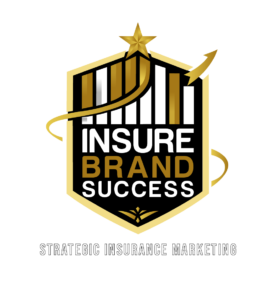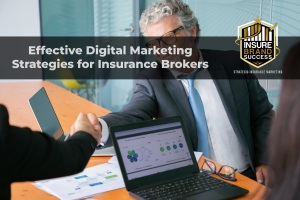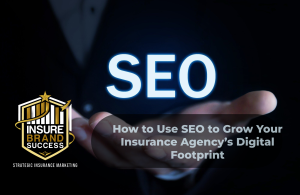In today’s digital-first world, your website serves as the front door to your insurance agency. It’s the first place potential clients will look when they need information about your services, and it plays a crucial role in shaping their perception of your brand. A well-designed website is no longer a luxury—it’s a necessity for the success and growth of your insurance agency. In fact, your website can be the difference between gaining a new client or losing one to a competitor.
Let’s dive into why web design is essential for your insurance agency’s growth and how it impacts your client acquisition and retention strategies.
1. First Impressions Matter: Creating Trust from the Start
Your website is often the first interaction a potential client will have with your insurance agency. A clean, professional, and user-friendly design will immediately convey that your agency is trustworthy and credible. On the other hand, a dated or difficult-to-navigate website can leave visitors frustrated, driving them to look for services elsewhere.
In the insurance industry, trust is paramount. Clients are entrusting you with their most personal information and financial well-being. A professional, easy-to-use website shows that you take your business seriously and are committed to providing quality service. Key design elements like an intuitive layout, clear calls-to-action, and engaging visuals can build that trust right from the get-go.
To ensure your website establishes that trust from the start, consider incorporating insurance marketing strategies that focus on both aesthetic appeal and functionality. Your website should not only be visually appealing but also make it easy for visitors to find information and take action.

2. Mobile Responsiveness: Catering to On-the-Go Clients
In a world where more people are accessing websites from mobile devices, ensuring your insurance agency’s website is mobile-responsive is critical. A responsive website automatically adjusts its layout to fit the screen size of any device, whether it’s a smartphone, tablet, or desktop. This flexibility provides a seamless experience for users, ensuring they can access your services no matter where they are.
Research shows that mobile-friendly websites lead to higher engagement and improved conversion rates. For insurance agencies, this means that your client acquisition efforts will be more effective because potential clients will be able to navigate your website easily, make inquiries, and even request quotes directly from their phones. Given that over 50% of web traffic now comes from mobile devices, mobile responsiveness is essential for scaling your business.
For tips on improving your website’s responsiveness, check out our Web Design for Insurance Agencies service.
3. SEO: Enhancing Visibility and Driving Organic Traffic
A website with great design alone won’t help if it isn’t visible to potential clients. SEO (Search Engine Optimization) is a crucial component of web design that ensures your insurance agency shows up in search results when clients are looking for services like yours. By integrating SEO best practices into your website’s design—such as optimizing titles, headers, images, and content for relevant keywords—you can improve your search engine rankings and attract more organic traffic.
Websites that are SEO-friendly are more likely to rank higher on search engines, making it easier for potential clients to find your agency. The more visible your website is in search results, the more likely you are to capture leads and convert them into paying clients. Combining a well-designed site with SEO optimization can significantly impact your agency’s client acquisition and retention programs, helping you stand out from the competition.
If you’re looking for SEO-specific strategies to improve your website’s ranking, our Insurance SEO Services can help optimize your website for maximum visibility.
4. Conversion Rate Optimization: Turning Visitors into Clients
A beautifully designed website may attract visitors, but its conversion rate optimization (CRO) that turns those visitors into clients. Every element of your website—from the layout to the text and images—should be designed with conversions in mind. This means your website needs to have clear, compelling calls-to-action (CTAs) that encourage visitors to take the next step, whether that’s filling out a quote form, scheduling a consultation, or calling for more information.
A good CRO strategy also involves understanding the user journey. Your website should lead visitors down a clear path, offering them the information they need and making it easy for them to make decisions. This might include placing CTAs prominently on each page, simplifying the quote process, or providing clear navigation options.
By focusing on these elements, you can ensure your website not only attracts visitors but also helps convert them into valuable clients.
5. User Experience (UX): Providing a Seamless Journey
User experience (UX) is the backbone of a well-designed website. UX refers to how users interact with your website and how easy and intuitive it is for them to find what they need. A positive UX can make a significant difference in how potential clients perceive your agency.
If your website is cluttered, hard to navigate, or filled with irrelevant information, visitors are more likely to leave without taking any action. On the other hand, a website that offers a clean layout, easy navigation, fast loading times, and relevant information will keep visitors engaged and encourage them to explore more.
By focusing on UX design, you not only make it easier for potential clients to find information but also improve their overall perception of your business. This can lead to higher client retention rates, as happy clients are more likely to return and refer others.
Our Digital Marketing for Insurance Agencies service can help you design a website that not only looks great but also provides a seamless and enjoyable user experience.
6. Trust Signals: Building Credibility Online
For an insurance agency, credibility is crucial to attracting and retaining clients. Your website design should incorporate trust signals that show potential clients they can rely on you with their insurance needs. These trust signals can include:
- Client testimonials and success stories
- Certifications and industry affiliations
- Security badges (e.g., SSL certificates for secure browsing)
- Case studies that highlight the success of your services
By incorporating these trust signals into your website’s design, you reassure visitors that your agency is reliable and professional. Trust is a major factor in client acquisition and client retention, and showcasing your agency’s credibility directly on your website can help you build stronger relationships with potential clients.
For more insights into how to effectively integrate these trust signals, explore our Insurance Email Marketing service, which helps you nurture client relationships and build trust through personalized email campaigns.
7. Analytics: Measuring Your Website’s Performance
A well-designed website should include tools for tracking and analyzing its performance. By using tools like Google Analytics, you can monitor metrics such as traffic, bounce rate, conversion rates, and user engagement. These insights can help you identify areas where your website excels and areas that need improvement.
Regularly reviewing these metrics allows you to make data-driven decisions about your website’s design, content, and functionality. This continuous optimization process ensures that your website stays aligned with your business goals and continues to drive client acquisition and retention over time.
8. Scalability: Future-Proofing Your Insurance Agency’s Growth
As your insurance agency grows, your website should be able to grow with it. A scalable website design ensures that you can easily add new content, services, and features as your agency expands. This includes adding new landing pages for additional services, creating a blog for educational content, or integrating new tools for online quotes or client communication.
A scalable website design ensures that you won’t have to overhaul your site every time your business grows or your marketing strategies evolve. This future-proofing will save you time, money, and resources in the long run.
FAQs
- Why is a well-designed website important for my insurance agency?
A well-designed website is crucial because it serves as the digital storefront of your insurance agency. It’s the first thing potential clients see when researching your services online. A professional, well-structured, and visually appealing website can convey trust, authority, and reliability—key attributes for clients who are considering your insurance services. A poorly designed or outdated website can create a negative first impression and drive clients to your competitors. A solid website not only reflects the quality of your services but also enhances your credibility and strengthens your brand identity. More importantly, it acts as an essential tool for client acquisition by making it easier for clients to learn about your services, contact you, and convert from visitors to clients.
- How does mobile-friendliness impact my website’s effectiveness?
Given that a significant portion of users now browse the internet on mobile devices, having a mobile-friendly website is absolutely essential. A mobile-responsive website automatically adjusts its layout based on the screen size, ensuring a smooth and consistent user experience across smartphones, tablets, and desktops. If your website isn’t optimized for mobile, users may have trouble navigating it, which leads to a higher bounce rate and fewer conversions. Google also uses mobile-first indexing, which means your website’s mobile version is prioritized in search engine rankings. So, not only does being mobile-friendly improve user experience, but it also plays a crucial role in improving your site’s visibility on search engines, ultimately contributing to your client acquisition strategy.
- Why should my website be SEO-optimized?
SEO (Search Engine Optimization) is the key to making your website visible to potential clients. When you optimize your website for SEO, you’re ensuring that search engines can find and rank your site when clients search for insurance services in your area. SEO practices like using relevant keywords, optimizing meta tags, improving page load speed, and creating valuable content help your website appear higher in search results. A website that is SEO-friendly not only drives more organic traffic but also ensures that your agency is found by individuals who are actively seeking the services you offer, leading to better client acquisition and long-term growth.

- What does it mean for a website to be user-centric?
A user-centric website design focuses on providing an intuitive, efficient, and engaging experience for visitors. This means considering the needs of your clients at every stage of their journey on your site. From easy navigation to clear calls to action, everything should be designed with the user in mind. For insurance agencies, this could mean having a simple quote request form, an easy-to-find phone number, or educational content that answers common questions about insurance. The goal is to ensure that visitors can find what they need quickly and easily, improving engagement and increasing the likelihood that they’ll contact you or take the next step toward becoming a client.
- How does a conversion-focused design help my business?
A conversion-focused website is specifically designed to encourage visitors to take action, whether it’s filling out a contact form, requesting a quote, or scheduling a consultation. This involves strategic placement of clear and compelling calls-to-action (CTAs), simplifying forms to make them easy to complete, and offering visitors easy ways to engage with your agency. A well-optimized conversion path can significantly improve your client acquisition rates. For insurance agencies, turning visitors into clients requires making the decision process as smooth as possible, and having a conversion-focused website design ensures you’re not losing valuable leads due to a poorly designed user experience.
- Why is website security important for my insurance agency?
When handling sensitive client data, especially in the insurance industry, website security is paramount. A secure website gives visitors peace of mind, knowing that their personal and financial information is protected. Features like SSL certificates (which enable HTTPS encryption) not only keep your website safe from cyber threats but also improve your credibility with search engines. Google has confirmed that websites with SSL certificates are given a ranking boost. Moreover, a secure website is also essential for complying with industry standards and regulations, further reinforcing trust with clients and protecting your business from potential security breaches.
- Can a well-designed website improve client retention?
A great website isn’t just about attracting new clients—it’s also a tool for retaining existing ones. By providing clients with a seamless experience, useful resources, and easy access to their policy information, your website can strengthen ongoing relationships. Client retention can be enhanced through features like self-service portals, educational content, and regular updates. A website that offers a user-friendly interface for managing policies or requesting quotes can improve satisfaction, making clients more likely to stay with your agency. Additionally, features like email newsletters and helpful blog posts keep your agency at the forefront of your clients’ minds.
- How does a website contribute to building brand authority?
A well-designed website that incorporates educational content, case studies, and client testimonials positions your agency as an authority in the insurance space. When you provide valuable resources, such as helpful blog posts or guides on topics like “How to Choose the Right Health Insurance,” you show your expertise and build trust with potential clients. Being seen as a thought leader in your industry can greatly increase your client acquisition potential as clients are more likely to trust agencies that demonstrate their knowledge and professionalism through well-crafted, informative content.
- Why is scalability important for my insurance agency’s website?
As your insurance agency grows, your website should grow with it. A scalable website design allows you to add new features, services, and content as your business expands. For example, you may want to add a new service, a blog, or an online quote tool in the future. A scalable website also ensures that your infrastructure can handle increased traffic and more user interactions, such as booking appointments or submitting forms. Scalability is essential for long-term success, as it allows you to continuously update and improve your website without needing a complete redesign each time your business evolves.
- What role does website analytics play in my digital marketing strategy?
Website analytics are essential for understanding how users interact with your site. By tracking metrics such as traffic, bounce rates, conversion rates, and average time spent on your site, you can identify areas for improvement and optimize your website accordingly. For example, if you notice that visitors are abandoning your quote request form halfway through, it could indicate that the form is too complex or lengthy. With tools like Google Analytics, you can make data-driven decisions to enhance your website’s user experience, improve its SEO, and refine your client acquisition strategies.
A well-designed website is one of the most powerful tools at your disposal for driving growth and success in the competitive insurance industry. By investing in a site that is mobile-friendly, SEO-optimized, user-centric, and conversion-focused, you can attract more clients, retain existing ones, and scale your business effectively.
For expert assistance in designing a website tailored to your insurance agency’s unique needs, explore our Web Design for Insurance Agencies service, where we create websites that not only look great but also perform great.




